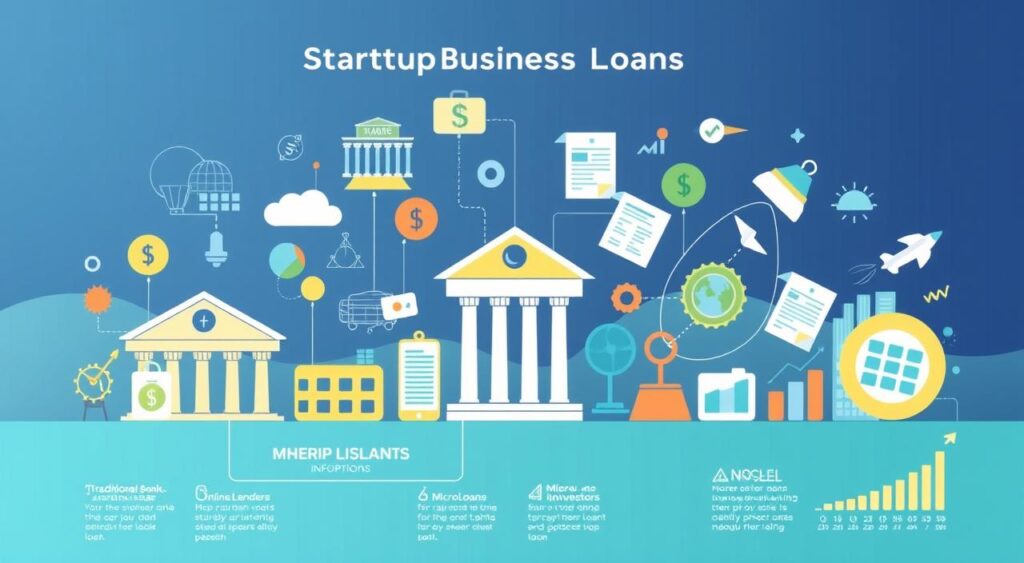Starting a business in 2024? Getting the right loan is key. Startup business loans help new owners turn ideas into real businesses. This article will show you the best loan options, what they offer, and what you need to apply.
Key Takeaways
- Learn about the different startup business loan options, like bank loans, SBA programs, and other financing.
- Find out what you need for a loan, including a good credit score, documents, and a solid business plan.
- Discover the best loan programs, like the SBA 7(a) loan, SBA microloans, and CDC/504 loans, and their benefits.
- Check out other funding options, like peer-to-peer lending and digital payments, for startups.
- Make applying easier by knowing about online lending and digital tools for 2024.
Understanding Startup Business Loans Requirements
Getting a Startup Business Loans is key to starting and growing a new business. Knowing what lenders want is crucial for getting approved. Let’s look at the main things startups need to focus on when looking for funding.
Credit Score Requirements for New Business Loans
Lenders set a minimum credit score for loan applicants. Usually, a score of 680 or more is best. It shows you’ve handled money well in the past. If your score is lower, you might still get a loan but with higher interest or needing more collateral.
Essential Documentation Needed
When you apply for a loan, you’ll need to provide a lot of financial info. This includes business credit reports, financial statements, and tax returns. These documents help lenders see if your business can pay back the loan.
Read also:- Personal Loan Approval with a Credit Score Under 650: Steps You Can Take
Business Plan Importance
A good business plan is very important when applying for a loan. It explains your company’s goals, how you plan to grow, and your financial plans. A solid plan shows lenders you have a clear way to make money and manage the loan.
Knowing these key requirements helps Startup Business Loans founders get the funding they need. This way, they can make their business ideas a reality and succeed in the market.
| Requirement | Details |
|---|---|
| Credit Score | Minimum 680, higher scores preferred |
| Financial Documents | Business credit reports, financial statements, tax returns |
| Business Plan | Comprehensive plan outlining vision, strategy, and financials |
Best Startup Business Loans and Their Features
Getting the right startup business loan can change everything for entrepreneurs. There are many loan types to look at, from term loans to lines of credit. Let’s dive into the key features of some top startup business loan options in 2024.
Term Loans
Term loans give you a big sum of money upfront. They come with fixed loan terms and interest rates. These loans are usually between $25,000 and $500,000, with repayment times from 1 to 5 years.
They’re great for startups that need money for big purchases or to grow their space.
Lines of Credit
A business line of credit lets you use a set amount of money when you need it. It’s a flexible way to get funds for daily costs or sudden opportunities. The interest rates can change, and repayment terms are often more flexible than term loans.
Equipment Financing
Equipment financing is perfect for startups that need special gear. These loans use the equipment as collateral, so you get lower interest rates and can borrow up to 100% of the equipment’s cost. Repayment terms match the equipment’s lifespan, making it a smart choice.

It’s important for startups to look closely at loan terms, interest rates, repayment options, and loan amounts. By understanding these features, entrepreneurs can pick the best loan for their business. This way, they can get the funding they need to grow their ventures.
SBA Loans for New Businesses
For startups and new businesses, SBA loans are a great option. They offer lower down payments, longer repayment terms, and better interest rates. This makes them perfect for entrepreneurs looking for long-term financing.
SBA 7(a) Loan Program
The SBA 7(a) Loan Program is the main loan offered by the Small Business Administration. It helps businesses get the capital they need for various purposes. With SBA guarantees, lenders take less risk, making it easier for startups to get funding.
SBA Microloans
The SBA Microloan program is for entrepreneurs with smaller financing needs. It offers loans up to $50,000. These loans are great for supporting new businesses, especially in underserved areas.
CDC/504 Loan Program
The CDC/504 Loan Program is for startups and small businesses. It helps with buying or improving real estate, or financing major equipment. SBA guarantees can cover up to 40% of the costs, with the rest from a commercial lender.
Applying for SBA loans can seem tough, but with the right help, startups can succeed. They can use government-backed loans to grow and thrive.

“The SBA loans have been a game-changer for our startup. The longer repayment terms and lower down payments have allowed us to invest in the right equipment and facilities to drive our business forward.”
Alternative Funding Solutions for Startups
Starting a new business is exciting, but finding the right funding can be tough. Entrepreneurs are now looking at new ways to get the money they need. This section looks at some fresh ways for startups to get the capital to grow.
Read also:- Credit Card for Travel Insurance: A Comprehensive Guide
Crowdfunding Platforms
Crowdfunding has become a big help for startups. Sites like Kickstarter and Indiegogo let entrepreneurs get money from many people. This way, they can see if people want their product and build a loyal customer base.
Angel Investors and Venture Capital
Angel investors and venture capitalists also offer funding. They invest in startups in exchange for a share of the company. Getting their support means you get money and advice from experts in your field.
Business Grants and Accelerators
Startups can also get grants, which don’t require giving up equity. Government and non-profit groups offer these grants. Accelerators provide money, advice, and resources to help startups grow fast.
| Funding Option | Pros | Cons |
|---|---|---|
| Crowdfunding | Direct connection with potential customers Gauge market interest No equity dilution | Competitive landscape Successful campaigns require significant marketing efforts Potential for project failure or delays |
| Angel Investors and Venture Capital | Access to substantial capital Experienced guidance and industry connections Potential for rapid growth | Intensive due diligence process Dilution of ownership Pressure to achieve high-growth targets |
| Business Grants and Accelerators | Non-dilutive funding Access to mentorship and resources Validation of business idea | Highly competitive application process Specific eligibility criteria Limited funding available |
Finding funding for startups can be both thrilling and tough. By looking into crowdfunding, angel investors, venture capital, and grants, entrepreneurs can get the money they need. With a smart plan and a willingness to try new things, startups can succeed and grow.

“Funding is one of the most crucial elements in the success or failure of a startup. Exploring alternative options can open up new avenues for entrepreneurs to bring their ideas to life.”
Online Lenders and Digital Financing Options
Online lenders and digital financing options are changing the game in startup financing. Platforms like Lending Club and Prosper connect entrepreneurs with investors. They use digital tools for quick approvals and flexible payments, helping businesses with limited credit.
Peer-to-Peer Lending Platforms
Platforms like Lending Club and Prosper are changing startup financing. They match borrowers with investors, offering funds traditional lenders might not. The whole process is online, with decisions based on more than just credit scores.
Digital Payment Solutions
Fintech companies offer digital payment solutions for quick capital access. Services like Square Capital and Paypal Working Capital use payment data for financing. They offer same-day funding and flexible payments, a great alternative to bank loans.
Online Application Process
Online lending is a big plus for startups. Fintech lenders make applying easy, from any device. This digital approach means faster approvals and a smoother funding experience, perfect for agile financing needs.
FAQ
What are the key requirements for obtaining a startup business loan?
To get a startup business loan, lenders look at a few key things. They want a good credit score and detailed financial statements. A solid business plan and enough collateral or personal guarantees are also important.
Startups need to show they have a good product or service. They must also have a clear market opportunity and the chance to grow and make money.
What are the different types of startup business loans available?
Startups have many financing options. They can choose from traditional bank loans or SBA-backed programs like the SBA 7(a) loan and microloans. There are also CDC/504 loans, alternative lenders, peer-to-peer platforms, and venture capital or angel investor funding.
Each option has its own features, requirements, and benefits for new businesses.
How can startups improve their chances of loan approval?
To boost their loan approval chances, startups should work on their credit score and keep accurate financial records. They should also have a detailed business plan and look at funding options beyond bank loans.
Exploring government-backed programs, like SBA loans, can be helpful. These loans often have better terms and lower credit score needs.
What is the role of a business plan in securing a startup loan?
A good business plan is key when applying for a startup loan. Lenders use it to check if the business is viable. They look at the founders’ skills, the market, financial forecasts, and growth potential.
A well-written business plan can really help a startup get the funding it needs.
How do online lenders and digital financing options differ from traditional bank loans?
Online lenders and digital financing options offer a quicker and easier application process. They often have more flexible credit requirements than traditional bank loans. But, they might have higher interest rates and shorter repayment terms.
Startups should weigh the pros and cons. They should pick the financing option that best fits their needs and goals.
What are the benefits of SBA loans for new businesses?
SBA loan programs, like the SBA 7(a) loan, SBA microloans, and CDC/504 loans, offer many benefits. They have lower down payments, longer repayment terms, and better interest rates. These loans also help startups with limited credit or collateral get the funding they need.
What are some alternative funding sources for startups beyond traditional bank loans?
Startups can look at crowdfunding platforms, angel investor networks, venture capital firms, and business grants or incubator programs. These options provide financial support and valuable resources. They can also offer mentorship, industry connections, and specialized help to help startups succeed.

